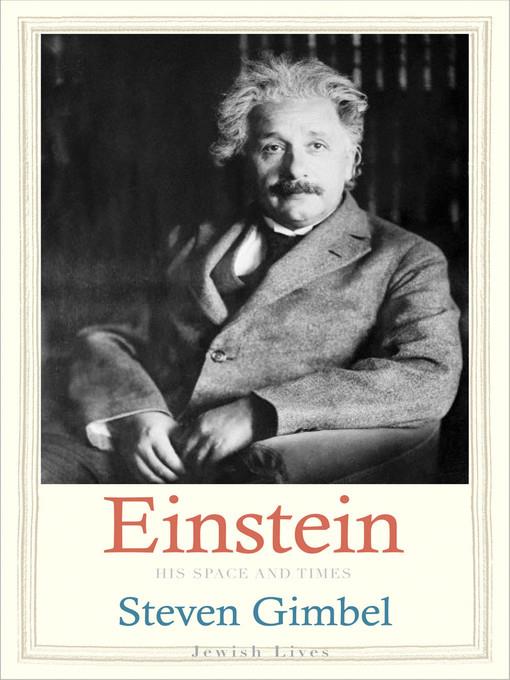
Einstein
His Space and Times
کتاب های مرتبط
- اطلاعات
- نقد و بررسی
- دیدگاه کاربران
نقد و بررسی

March 30, 2015
Gimbel (Einstein’s Jewish Science), chair of the philosophy department at Gettysburg College, provides a short, comprehensive portrait of Albert Einstein, covering both his life and scientific work. As an installment of Yale University Press’s “Jewish Lives” series, the book also focuses on Einstein’s understanding of himself as a Jew, despite his secular upbringing and beliefs. Gimbel doesn’t minimize Einstein’s flaws, revealing the “arrogance, lack of diligence, and unwillingness to follow directions” that cost him friends and jobs, as well as the politics behind the acceptance of his radical theories. In describing the latter part of Einstein’s life, Gimbel demonstrates the man’s personal complexity. During WWI, Einstein was a strong pacifist who wished for a “United States of Europe.” He carried a Swiss passport. His horror at the Nazis and their anti-Semitism drove him not to religion but to an ethnic sense of himself as a Jew. Einstein considered himself a Zionist, though given his outspoken belief in mutual acceptance, he did not support a nation-state, particularly one that took land from non-Jewish Palestinians. Gimbel reminds readers that Einstein was as personally complex as his theories, and that he thought as deeply about sociopolitical concerns as he did scientific ones.

February 15, 2015
How science, religion and politics shaped Einstein's life and work.As part of the Jewish Lives Series, Gimbel (Philosophy/Gettysburg Coll.; Einstein's Jewish Science: Physics at the Intersection of Politics and Religion, 2012, etc.) gives special emphasis to Einstein's connections to Judaism. Born to secular Jews in Germany in 1879, Einstein attended a Catholic school, where he was bullied for being "the Jewish kid." His response was rebellion: At the age of 8, he became "a deeply committed practicing Jew," observing dietary and religious laws. That early conversion, however, was short-lived. By high school, he became skeptical of mysticism, preferring to believe in "a wholly material universe guided by rational principles discoverable through scientific investigation." Continuing his education in Switzerland, his defiance against authorities of all kinds led to his renouncing his German nationality and eventually-in order to find a permanent job-taking on Swiss citizenship. Einstein's work in a patent office is well-known; Gimbel thinks the work was "enjoyable and challenging," since it involved investigating the technical originality of patent applications. Being a civil servant gave Einstein time to work on his own ideas, which culminated in publications that revolutionized thinking about matter, light, and Newtonian concepts of space, time, motion and mass. After being rejected for a Nobel Prize in physics for several years, Einstein finally earned one in 1921. Gimbel examines the role of anti-Semitism in Einstein's difficulty in securing teaching appointments, as well as the scientist's support of Zionism, which he hoped would help to create "a proud, self-possessed Jewish population who contributed to the betterment of all....Jews would be seen and, more important, see themselves, as valuable." The FBI considered his pacifism a sign of subversion and created a file on him. During the war, he was horrified by the potential of an atomic bomb, declaring after Hiroshima, "the war is won, but the peace is not." A fine, informative life of the renowned scientist.

April 1, 2015
Albert Einstein's theory of relativity and work as a scientist from an early age is world renowned. It is hard to imagine a biography that could put a new face on such a well-known figure, but this one does. While offering accessible scientific, and theoretical explanations, Gimbel provides enough information for the reader to understand the included principles without getting too into the details. The author couches all of this within a picture of Einstein's faith, something not emphasized in similar works. While it provides a look at Einstein's spirituality, the biography does not overpower the reader with it, giving ample time to personal relationships and professional and political aspects of the subject's life. VERDICT This title will appeal to both scientists and nonscientists who want an overview of Einstein's life (1879-1955). Not a science or a religious text, Gimbel's book will give readers a well-rounded look at a very famous scientific figure.--Dawn Lowe-Wincentsen, Oregon Inst. of Technology, Portland
Copyright 2015 Library Journal, LLC Used with permission.

Starred review from April 15, 2015
In the latest addition to Yale's Jewish Lives series, Gimbel focuses on a titan whose Jewishness was decidedly complicated. Readers see how the young Einstein repudiated his Jewish faith as he discovered modern science as an emancipatory global enterprise. But when Nazi anti-Semites attacked his theory of relativity as Jewish science, Einstein reassessed his ethnicity. With graceful lucidity, Gimbel illuminates the intensely personal challenges facing the great physicist as he struggled to align his scientific celebrity with renewed links to an ominously threatened minority group. The probing narrative particularly clarifies how fear that the Jews' most ferocious enemiesthe Naziswould develop an atomic bomb helped prompt Einstein to sign a fateful letter to FDR that helped launch the Manhattan Project. Einstein regretted signing that letter, but he never regretted turning decisively toward the Jewish community in America and Israel, so forging friendships with fellow Jews whose distinctive mindsetautonomous, capacious, creativeEinstein cherished as part of his ethnic heritage. Readers may turn to Isaacson or Pais for a fuller account of how this epoch-maker won his place in science's loftiest pantheon. Readers will thank Gimbel, however, for a narrative that reveals how this brilliant man recovered his place on earth among a much-beleaguered people.(Reprinted with permission of Booklist, copyright 2015, American Library Association.)

























دیدگاه کاربران